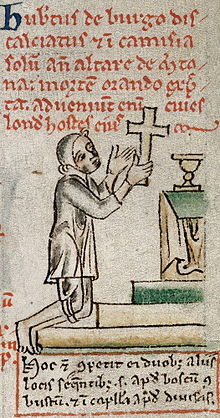Hubert de Burgh, 1st Earl of Kent
| Hubert de Burgh | |
|---|---|

Hubert de Burgh seeking sanctuary in 1234, by Matthew Paris
|
|
| Chief Justiciar of England | |
|
In office 1215–1232 |
|
| Monarch |
John Henry III |
| Preceded by | Peter des Roches |
| Succeeded by | Stephen de Segrave |
| Personal details | |
| Born | c. 1170 |
| Died | before 5 May 1243 Banstead, Surrey |
| Nationality | English |
| Spouse(s) | Beatrice de Warrenne Isabella, Countess of Gloucester Princess Margaret of Scotland |
| Children | John Hubert Margaret |
| Occupation | Earl of Kent |
Hubert de Burgh, 1st Earl of Kent (c. 1170 – before 5 May 1243) was Justiciar of England and Ireland and one of the most influential men in England during the reigns of King John (1199–1216) and of his infant son and successor King Henry III (1216–1272).
De Burgh's family were minor landholders in Norfolk and Suffolk, from whom he inherited at least four manors. His mother was named Alice, and his father may have been named Walter. He was the younger brother of William de Burgh (d. 1206), the founder of the de Burgh/Burke/Bourke dynasty in Ireland. His younger brother Geoffrey was Archdeacon of Norwich and then Bishop of Ely, and his younger brother Thomas was castellan of Norwich.
De Burgh entered the service of Prince John by 1198, and from then until 1202 rose in importance in John's administration. He served successively as count of Mortain, chamberlain of John's household, an ambassador to Portugal, sheriff first of Dorset and Somerset and then of Berkshire and Cornwall, custodian of the castles of Dover and Windsor, and then custodian of the Welsh Marches. For these services, he was granted a series of manors, baronies, and other castles, and became a powerful figure in John's administration.
...
Wikipedia
